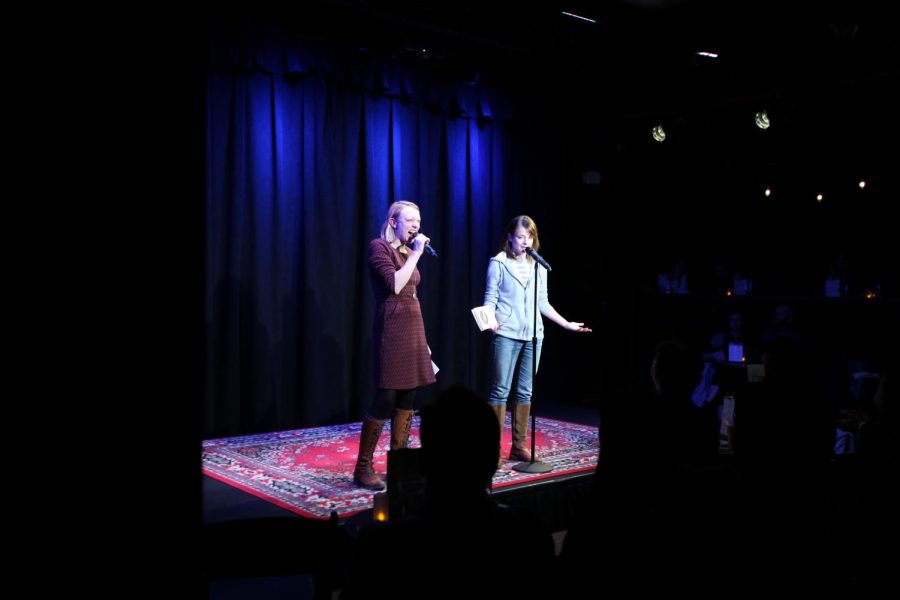A Panic Room for the Pedantic
Paula Croxson (left) and Erin Barker (right) warm up the crowds before the first set of storytellers.
February 14, 2018
Through an inconspicuous door just south of Houston Street is a hideaway for New York’s foremost poindexters. In the midst of the Trump era brain drain, ‘physicists, professors and the generally pedantic’ have found shelter at Caveat, a performance space and bar for The Story Collider troop.
“The first rule of Story Collider is no learning allowed,” Paula Croxson, Assistant Professor and Neuroscientist at the Icahn School of Medicine, said at Tuesday evening’s show. Swinging her mic to and fro in the searing spotlight of what looked to be a wizard’s common room, Croxson and Artistic Director of The Story Collider, Erin Barker, introduced the rules of the game.
“You’re not about to see a lecture,” Croxson said. “You’re not about to get any notes, there are no facts.”
“So put the pens away,” Barker said to a mixed audience of scientists and theatregoers.
Just four months shy of its eight-year anniversary, The Story Collider, founded by physicists Ben Lillie and Brian Wecht, is an initiative to marry scientific discourse with human narratives.
Story Collider meets monthly and brings together a curious ensemble of guest speakers, some of whom are pros, while most are just scientists with a story to share. The plan, to bring heart and humor to a community normally perceived as clinical, is all part of what Lillie calls intelligent nightlife.
“People in New York want to be more than just entertained,” said Croxson, huddled around a bar table with Barker and Lillie. “They can learn things and it doesn’t have to be dry and academic.”
“You should feel like you’re in a library,” Lillie said, spreading his arms to gesture at the sleepy reading room. “But like, a library where people are drinking, and having fun.”
As the lights dimmed down and the audience disappeared into the warm, wood-paneled lounge, speakers took to the stage. Hovering just inches above eager listeners, storytellers recalled powerful memories that subdued the audience from a roaring laugh to pin drop silence.
“If you don’t clap for us tonight, it’s treasonous.” Barker said. “If you don’t clap you’re pretty much a climate change denier.”
With that, like a twist of a key in the ignition, Barker started a fit of laughter that carried on through the first performer, Anita Flores.
Flores, a self-described Jew-tina, or Jewish-Latina, video producer and comedian, regaled listeners with the story of her close encounter with cancer. Arduously massaging humor from every sad twist of her story, Flores charmed the audience with excerpts of her post-surgery diary — a one-woman account of ten impossible weeks without masturbating.
When the crowd warmed up and the liquor seeped in, science journalist Peter Brannen grabbed the mic. A hush descended over the audience as Brannen told a devastating and uplifting story about losing his mother and his journey through grief.
“The earth we live on has been many before,” Brannen said, on a tangent about his study of mass extinction and geological disaster. “But the other half of the story is the recovery, and that’s just as interesting as the disaster.”
By night’s end, what little boundary there existed between audience and performer was gone. The room, it seemed, had become a community. These unconventional stories about science and the humanity fuelling scientific discovery had resonated throughout the room.
Just a stone’s throw from New York University, this hidden refuge for the weary academic or keen listener is trying to make learning, emoting and fun one and the same.
Sitting down for a drink, as crowds shuffled out, Croxson spoke of the power storytelling has had in her own life.
“As a scientist, I started to realize that it wasn’t a disadvantage to have a human side, when I was teaching and mentoring my students,” Croxson said. “It made their lives better, it made their work better, it made my interactions with my peers better. And it was making me a better scientist.”
Email Abe Selby at [email protected].
























































































































































